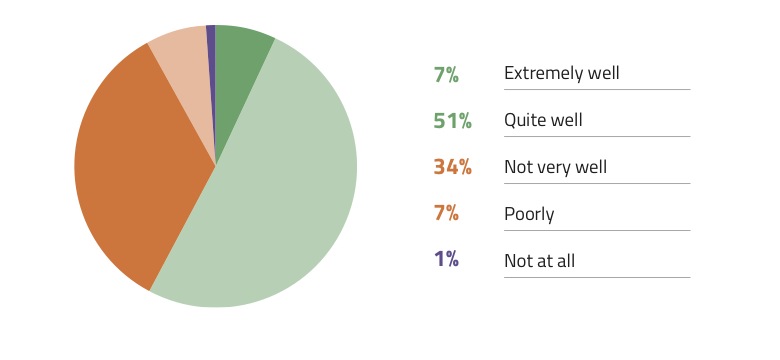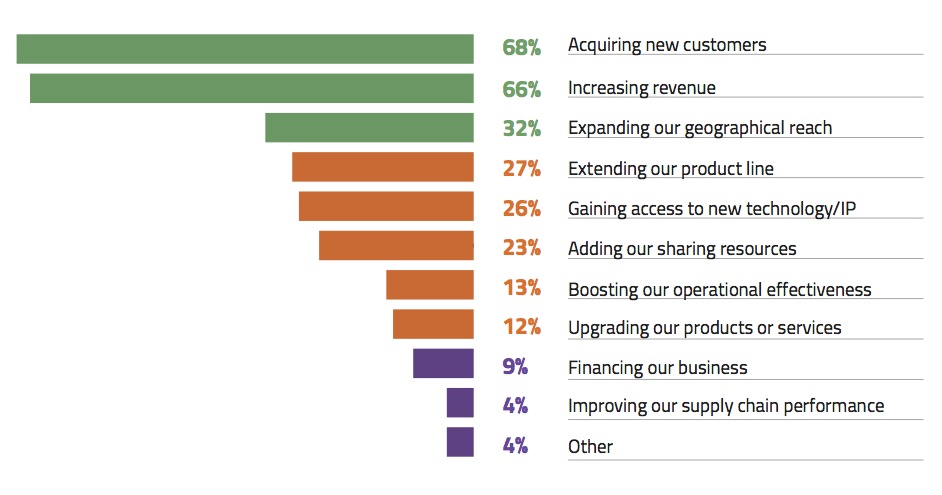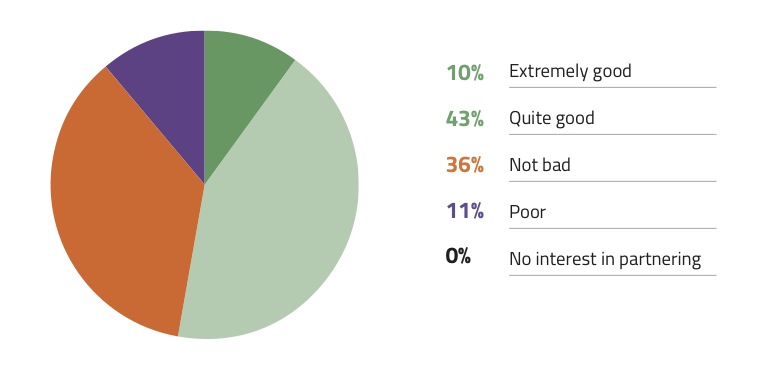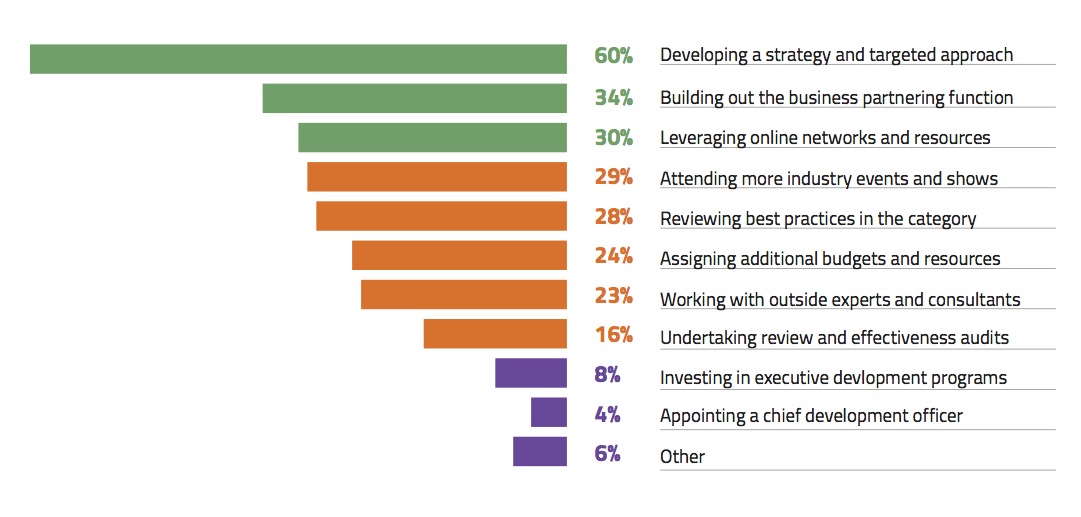Back
 "Grow from the Right Intro" is a report conducted and compiled by the CMO Council and BPI Network in conjunction with Powerlinx on the strategic value of business alliances and compatible partner matching.
"Grow from the Right Intro" is a report conducted and compiled by the CMO Council and BPI Network in conjunction with Powerlinx on the strategic value of business alliances and compatible partner matching. Companies are seeing increased value in establishing and growing global partnerships. More than half of respondents feel that these strategic alliances are extremely important to their business. Notably, no one reports that partnerships were unimportant or nonexistent.
Companies are seeing increased value in establishing and growing global partnerships. More than half of respondents feel that these strategic alliances are extremely important to their business. Notably, no one reports that partnerships were unimportant or nonexistent. While more than half of respondents feel that their companies develop and leverage partnerships well, only 7 percent feel their companies do it extremely well. Furthermore, 42 percent of respondents feel their companies are ineffective at developing partnerships.
While more than half of respondents feel that their companies develop and leverage partnerships well, only 7 percent feel their companies do it extremely well. Furthermore, 42 percent of respondents feel their companies are ineffective at developing partnerships. Only 1 percent of companies enjoy complete success in their partnerships. The fact that nearly half of the respondents rate their partnership strategy success at less than 60% makes it clear that the lack of structure and knowledge around the best practices in acquiring and retaining partnerships is a key factor leading to these unsuccessful partnership attempts.
Only 1 percent of companies enjoy complete success in their partnerships. The fact that nearly half of the respondents rate their partnership strategy success at less than 60% makes it clear that the lack of structure and knowledge around the best practices in acquiring and retaining partnerships is a key factor leading to these unsuccessful partnership attempts. While companies are investing significantly in partnership and business development, the range is quite large and depends on the size of companies and the importance they place in partnership development. The majority of respondents, some 70 percent, spend under $500,000 annually. Within that group, 60 percent of respondents spend less than $100,000 annually. Interestingly, while only 30 percent of companies spend over $500,000, of this group, the majority of businesses spend more than $5 million on partnership development. This clearly demonstrates the disparity in weight given to this business function.
While companies are investing significantly in partnership and business development, the range is quite large and depends on the size of companies and the importance they place in partnership development. The majority of respondents, some 70 percent, spend under $500,000 annually. Within that group, 60 percent of respondents spend less than $100,000 annually. Interestingly, while only 30 percent of companies spend over $500,000, of this group, the majority of businesses spend more than $5 million on partnership development. This clearly demonstrates the disparity in weight given to this business function. Respondents highlight increased market share and market access as the most significant benefits of partnering. In fact, increased revenue and an increased customer base are the main drivers, with expansion of geographical reach feeding into the former two. Also significant are product and technology development alliances. Respondents see the extension of product lines and resource sharing to be significant to their business. Partnerships help companies gain access to technology that will foster increased growth, breadth of products and efficiency.
Respondents highlight increased market share and market access as the most significant benefits of partnering. In fact, increased revenue and an increased customer base are the main drivers, with expansion of geographical reach feeding into the former two. Also significant are product and technology development alliances. Respondents see the extension of product lines and resource sharing to be significant to their business. Partnerships help companies gain access to technology that will foster increased growth, breadth of products and efficiency. While all respondents see value in partnerships, only half feel their companies effectively perform the actions necessary to identify and secure those partnerships. Most companies fall somewhere in the middle in terms of their competence in this area. Only 10 percent feel they perform extremely well in securing partner introductions, and only 11 percent feel they perform poorly in this area.
While all respondents see value in partnerships, only half feel their companies effectively perform the actions necessary to identify and secure those partnerships. Most companies fall somewhere in the middle in terms of their competence in this area. Only 10 percent feel they perform extremely well in securing partner introductions, and only 11 percent feel they perform poorly in this area. Strategic partnerships that allow access to new customers and new technologies are the top concern for those surveyed. New customers result in increased market share and revenue growth. New technologies also often bring about increased efficiency and better products. Of course new technologies bring secondary benefits as well such as the cost efficiencies that result from outsourcing sales and marketing activities.
Strategic partnerships that allow access to new customers and new technologies are the top concern for those surveyed. New customers result in increased market share and revenue growth. New technologies also often bring about increased efficiency and better products. Of course new technologies bring secondary benefits as well such as the cost efficiencies that result from outsourcing sales and marketing activities. Only a third of respondents have a formal partnering strategy in place, but many are taking steps to create formal business plans. In fact, a quarter of respondents are in the process of developing a formal strategy, but 39 percent have no formal strategy. The fact that two-thirds of respondents either do not have a formal strategy or are working toward developing that strategy demonstrates the lack of knowledge around the most effective methods for acquiring partners, which leads to the lack of successful partnerships noted above.
Only a third of respondents have a formal partnering strategy in place, but many are taking steps to create formal business plans. In fact, a quarter of respondents are in the process of developing a formal strategy, but 39 percent have no formal strategy. The fact that two-thirds of respondents either do not have a formal strategy or are working toward developing that strategy demonstrates the lack of knowledge around the most effective methods for acquiring partners, which leads to the lack of successful partnerships noted above. In the growing global community, seeking out the right partnerships can be difficult. Finding those partnerships is proving to be a challenge, and once they are found, securing them and determining how to leverage them is of increasing concern. There are also significant difficulties in maintaining the partnerships. Understanding how partners can continue to grow together and maintain a long-term, mutually beneficial relationship is proving to be the largest concern for most companies. While it appears that tactical, short-term partnerships are working, the difficulty of finding and securing those partnerships will only pay off if the relationships can be successfully maintained for the long term.
In the growing global community, seeking out the right partnerships can be difficult. Finding those partnerships is proving to be a challenge, and once they are found, securing them and determining how to leverage them is of increasing concern. There are also significant difficulties in maintaining the partnerships. Understanding how partners can continue to grow together and maintain a long-term, mutually beneficial relationship is proving to be the largest concern for most companies. While it appears that tactical, short-term partnerships are working, the difficulty of finding and securing those partnerships will only pay off if the relationships can be successfully maintained for the long term. Developing a strategy and targeted approach to alliance management is the top priority for most companies. Without a formal strategy in place, partnership attempts are often unsuccessful. Respondents note that investment and outreach are necessary approaches for improving their processes. They also see the value in external resources that can provide them with key insights, resources and networks.
Developing a strategy and targeted approach to alliance management is the top priority for most companies. Without a formal strategy in place, partnership attempts are often unsuccessful. Respondents note that investment and outreach are necessary approaches for improving their processes. They also see the value in external resources that can provide them with key insights, resources and networks. Respondents see the most value in leveraging relationships to advance their business development process. Executives tend to turn to their peers for feedback, best practices and links to key partnerships. Respondents also see the value in events such as conferences where they can continue to learn from their peers and expand their network. Respondents rely less on intermediaries like brokers as they feel the lack of personal networking is less effective in determining key alliances.
Respondents see the most value in leveraging relationships to advance their business development process. Executives tend to turn to their peers for feedback, best practices and links to key partnerships. Respondents also see the value in events such as conferences where they can continue to learn from their peers and expand their network. Respondents rely less on intermediaries like brokers as they feel the lack of personal networking is less effective in determining key alliances. Three-quarters of respondents would or might use a matchmaking platform to create business partnerships. While respondents note the difficulty in determining the best partnerships on their own, they also place heavy weight on personal relationships in creating effective partnerships. Respondents are more likely to utilize a matchmaking platform if they feel they will maintain control over the relationship-building aspect of acquiring partners.
Three-quarters of respondents would or might use a matchmaking platform to create business partnerships. While respondents note the difficulty in determining the best partnerships on their own, they also place heavy weight on personal relationships in creating effective partnerships. Respondents are more likely to utilize a matchmaking platform if they feel they will maintain control over the relationship-building aspect of acquiring partners.
Grow from the Right Intro: The Value of Strategic Partnerships [REPORT]
 "Grow from the Right Intro" is a report conducted and compiled by the CMO Council and BPI Network in conjunction with Powerlinx on the strategic value of business alliances and compatible partner matching.
"Grow from the Right Intro" is a report conducted and compiled by the CMO Council and BPI Network in conjunction with Powerlinx on the strategic value of business alliances and compatible partner matching.Grow from the Right Intro: Executive Summary
CEOs across all business sectors agree that strategic partnerships are critical for any company looking to compete on a global scale. Smart companies see partnerships as a way to acquire customers, drive revenue and enter new markets. They also rely on partners for new ideas, insights and expertise that can impact business performance, market understanding and product innovation.Despite the increasing need to develop partner relationships, most enterprises lack the knowledge, connections and management capabilities to realize the full potential of partnering. Many companies lack the formal strategies and expertise to identify and nurture the most beneficial relationships. As a result, almost all are seeking a new and better way.This special report - Grow from the Right Intro - examines the importance of strategic partnerships and alliances in business growth, explores the challenges and opportunities of identifying and creating them and discusses how to maximize the chances of success, which includes making use of big data analytics and automation.Powerlinx was created to solve the problem of identifying and connecting with valuable partners who may be outside of a known or existing network. While most executives realize the importance that strategic partnerships hold in their overall business growth strategy, many are limited by resources and timing allocated to pursuing them. Powerlinx overcomes these present-day obstacles by algorithmically identifying and connecting companies to each other, allowing each company to pursue its growth goals and objectives in a more efficient and cost-effective way.A selection of data points from the report are listed below.How important are strategic partnerships and alliances to your business?
 Companies are seeing increased value in establishing and growing global partnerships. More than half of respondents feel that these strategic alliances are extremely important to their business. Notably, no one reports that partnerships were unimportant or nonexistent.
Companies are seeing increased value in establishing and growing global partnerships. More than half of respondents feel that these strategic alliances are extremely important to their business. Notably, no one reports that partnerships were unimportant or nonexistent.How well does your company develop and leverage business partnerships and strategic alliances?
 While more than half of respondents feel that their companies develop and leverage partnerships well, only 7 percent feel their companies do it extremely well. Furthermore, 42 percent of respondents feel their companies are ineffective at developing partnerships.
While more than half of respondents feel that their companies develop and leverage partnerships well, only 7 percent feel their companies do it extremely well. Furthermore, 42 percent of respondents feel their companies are ineffective at developing partnerships.What percentage of your partnerships do you believe have been successful?
 Only 1 percent of companies enjoy complete success in their partnerships. The fact that nearly half of the respondents rate their partnership strategy success at less than 60% makes it clear that the lack of structure and knowledge around the best practices in acquiring and retaining partnerships is a key factor leading to these unsuccessful partnership attempts.
Only 1 percent of companies enjoy complete success in their partnerships. The fact that nearly half of the respondents rate their partnership strategy success at less than 60% makes it clear that the lack of structure and knowledge around the best practices in acquiring and retaining partnerships is a key factor leading to these unsuccessful partnership attempts.Do you have a sense of how much you invest annually in partnering?
 While companies are investing significantly in partnership and business development, the range is quite large and depends on the size of companies and the importance they place in partnership development. The majority of respondents, some 70 percent, spend under $500,000 annually. Within that group, 60 percent of respondents spend less than $100,000 annually. Interestingly, while only 30 percent of companies spend over $500,000, of this group, the majority of businesses spend more than $5 million on partnership development. This clearly demonstrates the disparity in weight given to this business function.
While companies are investing significantly in partnership and business development, the range is quite large and depends on the size of companies and the importance they place in partnership development. The majority of respondents, some 70 percent, spend under $500,000 annually. Within that group, 60 percent of respondents spend less than $100,000 annually. Interestingly, while only 30 percent of companies spend over $500,000, of this group, the majority of businesses spend more than $5 million on partnership development. This clearly demonstrates the disparity in weight given to this business function.In what areas would effective partnerships most benefit your company?
 Respondents highlight increased market share and market access as the most significant benefits of partnering. In fact, increased revenue and an increased customer base are the main drivers, with expansion of geographical reach feeding into the former two. Also significant are product and technology development alliances. Respondents see the extension of product lines and resource sharing to be significant to their business. Partnerships help companies gain access to technology that will foster increased growth, breadth of products and efficiency.
Respondents highlight increased market share and market access as the most significant benefits of partnering. In fact, increased revenue and an increased customer base are the main drivers, with expansion of geographical reach feeding into the former two. Also significant are product and technology development alliances. Respondents see the extension of product lines and resource sharing to be significant to their business. Partnerships help companies gain access to technology that will foster increased growth, breadth of products and efficiency.How do you rate your ability to identify, qualify and secure partner introductions?
 While all respondents see value in partnerships, only half feel their companies effectively perform the actions necessary to identify and secure those partnerships. Most companies fall somewhere in the middle in terms of their competence in this area. Only 10 percent feel they perform extremely well in securing partner introductions, and only 11 percent feel they perform poorly in this area.
While all respondents see value in partnerships, only half feel their companies effectively perform the actions necessary to identify and secure those partnerships. Most companies fall somewhere in the middle in terms of their competence in this area. Only 10 percent feel they perform extremely well in securing partner introductions, and only 11 percent feel they perform poorly in this area.What types of partnerships, opportunities or introductions would most benefit your company?
 Strategic partnerships that allow access to new customers and new technologies are the top concern for those surveyed. New customers result in increased market share and revenue growth. New technologies also often bring about increased efficiency and better products. Of course new technologies bring secondary benefits as well such as the cost efficiencies that result from outsourcing sales and marketing activities.
Strategic partnerships that allow access to new customers and new technologies are the top concern for those surveyed. New customers result in increased market share and revenue growth. New technologies also often bring about increased efficiency and better products. Of course new technologies bring secondary benefits as well such as the cost efficiencies that result from outsourcing sales and marketing activities.Do you have a formal partnering strategy?
 Only a third of respondents have a formal partnering strategy in place, but many are taking steps to create formal business plans. In fact, a quarter of respondents are in the process of developing a formal strategy, but 39 percent have no formal strategy. The fact that two-thirds of respondents either do not have a formal strategy or are working toward developing that strategy demonstrates the lack of knowledge around the most effective methods for acquiring partners, which leads to the lack of successful partnerships noted above.
Only a third of respondents have a formal partnering strategy in place, but many are taking steps to create formal business plans. In fact, a quarter of respondents are in the process of developing a formal strategy, but 39 percent have no formal strategy. The fact that two-thirds of respondents either do not have a formal strategy or are working toward developing that strategy demonstrates the lack of knowledge around the most effective methods for acquiring partners, which leads to the lack of successful partnerships noted above.What challenges or complexities have you faced in developing and managing strategic partnerships?
 In the growing global community, seeking out the right partnerships can be difficult. Finding those partnerships is proving to be a challenge, and once they are found, securing them and determining how to leverage them is of increasing concern. There are also significant difficulties in maintaining the partnerships. Understanding how partners can continue to grow together and maintain a long-term, mutually beneficial relationship is proving to be the largest concern for most companies. While it appears that tactical, short-term partnerships are working, the difficulty of finding and securing those partnerships will only pay off if the relationships can be successfully maintained for the long term.
In the growing global community, seeking out the right partnerships can be difficult. Finding those partnerships is proving to be a challenge, and once they are found, securing them and determining how to leverage them is of increasing concern. There are also significant difficulties in maintaining the partnerships. Understanding how partners can continue to grow together and maintain a long-term, mutually beneficial relationship is proving to be the largest concern for most companies. While it appears that tactical, short-term partnerships are working, the difficulty of finding and securing those partnerships will only pay off if the relationships can be successfully maintained for the long term.What plans do you have for improving your networking, partnering and sourcing of growth opportunities worldwide?
 Developing a strategy and targeted approach to alliance management is the top priority for most companies. Without a formal strategy in place, partnership attempts are often unsuccessful. Respondents note that investment and outreach are necessary approaches for improving their processes. They also see the value in external resources that can provide them with key insights, resources and networks.
Developing a strategy and targeted approach to alliance management is the top priority for most companies. Without a formal strategy in place, partnership attempts are often unsuccessful. Respondents note that investment and outreach are necessary approaches for improving their processes. They also see the value in external resources that can provide them with key insights, resources and networks.What channels, networks or resources are you evaluating or using to advance your business development process?
 Respondents see the most value in leveraging relationships to advance their business development process. Executives tend to turn to their peers for feedback, best practices and links to key partnerships. Respondents also see the value in events such as conferences where they can continue to learn from their peers and expand their network. Respondents rely less on intermediaries like brokers as they feel the lack of personal networking is less effective in determining key alliances.
Respondents see the most value in leveraging relationships to advance their business development process. Executives tend to turn to their peers for feedback, best practices and links to key partnerships. Respondents also see the value in events such as conferences where they can continue to learn from their peers and expand their network. Respondents rely less on intermediaries like brokers as they feel the lack of personal networking is less effective in determining key alliances.Would you be interested in a cloud-based platform that automates the process of making the right business introductions through intelligent B2B matchmaking on a global scale?
 Three-quarters of respondents would or might use a matchmaking platform to create business partnerships. While respondents note the difficulty in determining the best partnerships on their own, they also place heavy weight on personal relationships in creating effective partnerships. Respondents are more likely to utilize a matchmaking platform if they feel they will maintain control over the relationship-building aspect of acquiring partners.
Three-quarters of respondents would or might use a matchmaking platform to create business partnerships. While respondents note the difficulty in determining the best partnerships on their own, they also place heavy weight on personal relationships in creating effective partnerships. Respondents are more likely to utilize a matchmaking platform if they feel they will maintain control over the relationship-building aspect of acquiring partners.